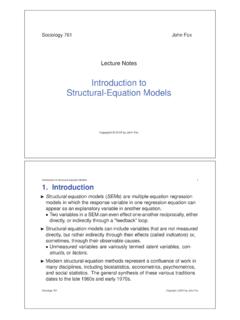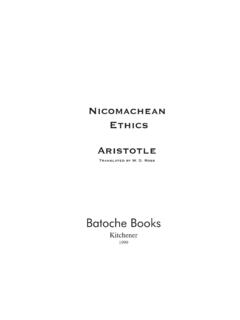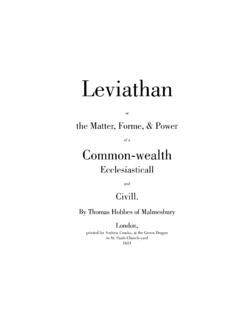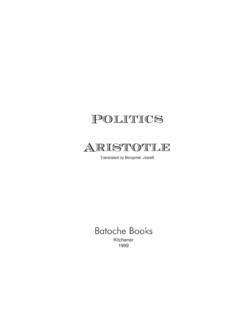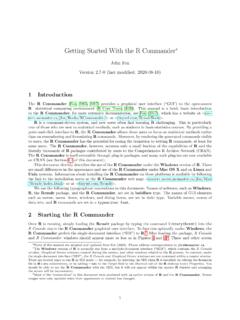Transcription of Economic and Social Conditions in France During the 18th ...
1 Economic and Social Conditions in FranceDuring the Eighteenth CenturyHenri S eProfessor at the University of RennesTranslated by Edwin H. ZeydelBatoche BooksKitchener2004 Originally Published 1927 Translation of La France conomique et Sociale Au XVIIIe Si cleThis edition 2004 Batoche ..5 Chapter 1: Land Property; its Distribution. The Population of France .. 10 Chapter 2: The Peasants and Agriculture .. 17 Chapter 3: The Clergy .. 38 Chapter 4: The Nobility .. 50 Chapter 5: Parliamentary Nobility and Administrative 65 Chapter 6: Petty Industry. The Trades and Guilds .. 69 Chapter 7: Commercial Development in the Eighteenth 77 Chapter 8: Industrial Development in the Eighteenth 86 Chapter 9: The Classes of Workmen and Merchants .. 95 Chapter 10: The Financiers .. 103 Chapter 11: High and Middle Bourgeoisie .. 107 IntroductionIIf we would arrive at a true understanding of the nature of contemporary society, wemust first get a picture of the Economic and Social life of France in former times, espe-cially in the eighteenth century.
2 Indeed, there is no more instructive method than thecomparative, for it clearly reveals the similarities and, in particular, the only one hundred and fifty years a brief period in the history of human-ity separate us from the era which we propose to study, it seems at first glance that theFrance of today bears very little resemblance to the France of Louis XVI. This is readilyexplained. In the intervening years the ancien r gime was overthrown and the Revolutiontransformed all political and Social institutions. Then, too, a profound Economic revolu-tion, in the nineteenth century, affecting France as well as all other countries, has alteredthe Conditions of our material existence and our whole mode of fact which strikes us at the very outset is that the Revolution overturned all theold legal institutions. In eighteenth century France the Social classes, as we conceivethem today, can be detected only by an attentive observer of the realities of economiclife.
3 The superficial student sees merely the legal distinctions. Three estates can be dis-cerned the clergy, the nobility, and the third estate. Between them rise the barriers ofsecular privileges of the clergy and nobility constitute one of the characteristic featuresof eighteenth century society. Clergy and nobility exercised a preeminent right over allland property. The manorial dues of various kinds that they imposed upon the peasantswho tilled the soil formed one of their chief sources of revenue. Clergy and nobility thusevaded most of the taxes and financial burdens that fell upon the popular classes and6 / Henri S etended to increase their misery. Finally, most of the functions of the state were the pre-rogative of the privileged classes, especially of the nobility. Hence it is easy to under-stand why one of the great demands of the third estate in 1789 was precisely the partici-pation of all classes in all duties and is true that the ecclesiastical offices, in theory at least, seemed accessible to thecommoners as well as the nobles; but in reality all the dignities of the high clergy, theepiscopal sees, the abbeys, and the rich ecclesiastical benefits, were reserved to mem-bers of the nobility, especially the court nobility, to an increasingly exclusive extent as weapproach the legal barriers separating the various classes became greater and greater as theancien r gime neared its end.
4 We shall see later that the breach became ever widerbetween the nobles and the commoners. The nobility, although continuing to be recruitedfrom the class of newly rich at least from the world of finance, tended to become aclosed caste. The revision of the titles of nobility (reformations de la noblesse), achievedduring the time of Louis XIV, did not, to be sure, consist primarily of fiscal measures, yetit cut off from the nobility families of recent extraction, especially those continuing todevote themselves to commerce, or noblemen too poor to assert their yet the eighteenth century prepared the way for the profound transformations thatwere destined to characterize our own era and to change the aspect of the entire socialworld. Capitalism, in its commercial form at least, already loomed as a power and beganto exert a great influence upon industry itself.
5 The merchants, controlling rural industrymore and more actively, opened the way for great capitalist industry. In the urban trades,at least in the textile trades, they often succeeded also in bringing under their economicdomination the workmen who, formerly independent, now became salaried old labor organization no longer answered the new needs. At the close of the cen-tury, even after the failure of Turgot s reform, the trade guilds were introduction of machinery, at first restricted to a few industries, especially cot-ton-spinning, as well as industrial concentration, manifested in certain centers of theclothing industry and in the manufacture of prints, point also to the new this was only the beginning. On the whole, the old Economic practises were stilladhered to. In spite of progress in road building, the avenues of communication re-mained insufficient.
6 The means of transportation had been changed, but not appreciablytransformed, since the beginning of modern times. Maritime commerce had made greatstrides in the eighteenth century, and had greatly increased the national wealth; but navi-gation had scarcely changed since the seventeenth century. Tonnage remained small, andthere was hardly a vessel of more than 400 or 500 it not significant that among the third estate of most of the cities, first place wasEconomic and Social Conditions in France During the Eighteenth Century / 7occupied by lawyers, both advocates and attorneys, or by financiers, namely employeesof the general farm or collectors of the royal taxes? Only in the larger ports did themerchants play an important r short, for any one studying Economic evolution, the great transformations did notcome until the following century.
7 France under the new monarchy, until the approach of1848, still preserved most of the characteristics of the ancien r one permanent trait of the Economic and Social history of France was strikinglyrevealed in the eighteenth century. This was the strengthening and perpetuation of thesystem of peasant ownership. It is well known that this ownership was gradually estab-lished During the Middle Ages under the guise of feudal tenure. The peasants, from thebeginning of the Middle Ages, were completely freed from servitude in most parts ofFrance and came to own the land they cultivated, with the right to will it to heirs, or to sellor exchange it. This property, however, was burdened with dues imposed by the mano-rial system, made particularly irksome because of the latter s practices and abuses. Andyet there is reason to believe that the continuation of the manorial system up to theRevolution helped toward the consolidation of peasant ownership.
8 This seems to us allthe more plausible if we reflect that in England, where the manorial system was consider-ably weakened toward the end of the Middle Ages, peasant ownership was ultimatelyeliminated almost altogether in favor of the landed that may be, it will suffice for our purposes to observe that the Revolutionradically abolished the manorial system, making peasant ownership completely autono-mous. Not that all the peasants became property owners, for many owned little or noland and constituted a veritable rural proletariat; but they comprised probably only aminority among the rural population. At any rate, the agrarian system of France has aprofoundly original character, which distinguishes it from that of most of the other Euro-pean countries. This is true to such an extent that even in our own day France hasremained a type of rural democracy.
9 In Western Europe it is the only great state in whichthe equilibrium is not disturbed in favor of industrial development. In this respect thepresent is closely related to the condition of land property, as it existed in the eighteenth century, also explainswhy in France the progress of agriculture was much slower than in countries where thelanded aristocracy eliminated peasant ownership. France was also the country of landcultivation on a small scale. The proprietors, whether they belonged to the nobility or tothe bourgeoisie, did not personally engage in cultivation. The peasants themselves culti-vated all the land; but their resources were too small to permit them to take advantage ofreal agricultural improvements. They adhered to the old methods, and these tended to-ward the maintenance of the moors and meadows, the joint use of which was regarded as8 / Henri S eabsolutely necessary for the requirements of the peasant masses.
10 The great clearingscould not, in spite of some notable efforts, prove practicable. Uncultivated lands couldbe used only with partial success. In short, the new system of rural economy did notreally triumph until the second half of the nineteenth century. Until about 1840 Frenchagriculture still bore a close resemblance to that of the ancien r see, then, that the Economic life of the eighteenth century was destined to extendbeyond the Great Revolution. The latter effected above all the abolition of the legal preroga-tives which separated the third estate from the privileged classes. This abolition graduallyhad an effect upon the Economic development itself. It helped, though to a smaller de-gree than the progress of capitalism, to bring about a new division of the Social classes,based upon the Economic r le that they played. On the other hand, the application ofscience to industry, which began in the eighteenth century, the triumph of steam, fol-lowed by that of electricity, and the revolution effected by the new means of transporta-tion (railways and steamships) tended to overcome the ways and means of the ancienr gime and to transform all the Conditions of material are the reasons why the eighteenth century seems to us of today so yet it is in fact very close to us, if we consider that everything which touches con-temporary life had its beginnings in that period.
